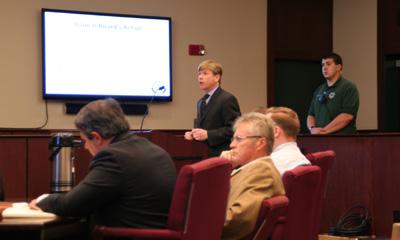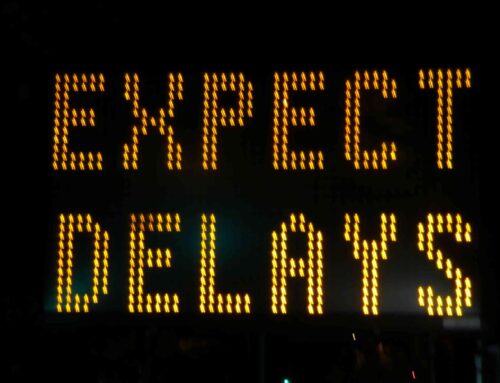Public records practices of Sumner County Schools under scrutiny at trial
Ken Jakes, an open government advocate and a candidate for an at-large council position on Nashville’s Metro Council, is expected to testify Thursday morning in a public records lawsuit he brought against Sumner County Schools.
Jakes sued after making a request in March 2014 to inspect the school district’s public records policy. District officials say his request, though they received it, was not valid because he sent it by email. Jakes also followed up with a phone call and left a voice mail.
At issue is whether Sumner County Schools officials can refuse to respond to a public records request if it is received by email. The district’s policy at the time required that all requests to inspect public records be made in writing or in person. The standing practice, however, went farther. According to testimony on Wednesday those written requests could not be emailed, but had to be received through the U.S. Postal Service.
The school board’s regular attorney, Jim Fuqua (also a former mayor of Hendersonville, a Sumner County commissioner and a Sumner School Board member) testified that the policy had fallen out of compliance with the Tennessee Public Records Act in that it required a written request to inspect a public record at all. Still, the school district maintains that it gave an option for Jakes to appear in person as an alternative.
Jakes contends that he made a valid request, that it was denied, and that it was denied willfully.
His attorney, Kirk Clements, quoted the law in opening arguments: “All state, county and municipal records shall, at all times during business hours, which for public hospitals shall be during the business hours of their administrative offices, be open for personal inspection by any citizen of this state, and those in charge of the records shall not refuse such right of inspection to any citizen, unless otherwise provided by state law.”
“It doesn’t say that the citizen shall request personal inspection as dictated by the governmental entity….It says they shall not refuse (inspection) unless otherwise provided by state law. That’s what they did here. They defied the plain language of the TPRA by refusing Mr. Jakes’ record request. Which is not disputed. They received it.”

The school district’s attorney Todd Presnell argued that the board had a policy that requests be in person or by US Postal service. In the foreground is Kirk Clements and Ken Jakes.
The school board’s attorney, Todd Presnell with Bradley Arant Boult Cummings, argued that the school district had a policy about how records requests were to be received, and Jakes did not follow it, making his request invalid. “He did not comply with that initial threshold issue that would be the trigger for our response time. And without that trigger, all of that really falls away.”
Judge Dee David Gay followed up by asking where in the public records act it authorized a government agency to dictate how it will receive requests.
“So basically your argument is that … you have the authority to dictate how you receive requests. But I want to be clear that there is no specific statutory authority and no authority anywhere gives the school board the authority to dictate how a public records request for inspection should come in. Am I correct?” Gay asked.
“Your honor, I submit to you that the silence on that shows that governmental entities have discretion to implement policies the way they want to given the public records they house and store…” Presnell said.
The trial brought several facts to light about public records requests at the school district. One of the most surprising to many in the courtroom audience, including apparently the judge who stopped to clarify what he heard, was that the school district receives on average only 12 to 15 public records requests a year.
The testimony came from Jeremy Johnson, the supervisor of board and community relations, who received Jakes’ requests and handles public records requests for the district.
Johnson, who spent more time than anyone on the stand, also testified that he treats requests for records differently, depending on whether it’s a “formal” request in which the Tennessee Public Records Act is invoked in the request, or whether it’s a casual request for a document, not mentioning the public records act.
In a cross examination, Clements pointed out that Johnson testified that his practices of responding to public records requests were consistent – that he would not accept records requests by email. Johnson confirmed that and agreed he “never” accepted a records request by email and always required an in-person request or mailed through the U.S. Postal Service.
Then Clements asked Johnson if he had accepted and responded to records requests by email from journalists, some of who were in the courtroom observing the trial that day, Johnson said he had.
He explained that he did not consider such requests to be formal because they did not mention the Tennessee Public Records Act specifically, so he did not have to follow the policy in responding.
Clements: So why didn’t you simply then respond to Mr. Jakes’ records request and provide the link (to the public records policy online)?
Johnson: Because it was not consistent with our practices of responding to formal open records requests.
Clements: OK. I understand that’s what you are saying, but you just testified differently. That you have in the past responded to emailed records request. So, again, you haven’t applied (your policy) consistently, don’t you agree, Mr. Johnson?
Johnson: No. Again, there’s a difference in making a formal request under the open records act and a reporter or citizen just saying, hey, I’m looking for this information, could you provide it to me? We can respond and we can not respond. We can answer questions.
Clements: So you are saying there is a difference when someone references the Tennessee Public Records Act and when someone doesn’t reference the public records act?
Johnson: Yes.
Clements: So if Mr. Jakes had said nothing about the Tennessee Public Records Act, you would have responded with a link. Is that what your testimony is?
Johnson: Correct. If he had not been making a request to inspect. Had he just said, I’m looking for this policy, we would have complied and provided it or let him come look at it. Or at least tell him where it was on the website.
Clements: So the mistake Mr. Jakes made was that he followed the law? Was that the mistake that Mr. Jakes made?
Johnson: I wouldn’t say Mr. Jakes made a mistake. I would say he was making a formal request to inspect which invokes the formal policy.
Clements: So if he didn’t rely on law, you would have responded and we wouldn’t be here today.
Johnson: Yes
Clements: Is that your position?
Johnson: Had he simply posed the question, yes.
Clements: Is that part of your policy? You’ve made several policies here. Does it say anywhere in there if you don’t invoke the Tennessee Public Records Act, then none of this applies? Is that in any of your policies?
Johnson: No, sir.
Clements: So how is the public supposed to know that? That there’s this arduous process they have to go through if they invoke the Tennessee Public Records Act, but if they don’t mention that, they can send an email, voice mail, whatever. How is the public supposed to know that?
Johnson: Our attempt is to provide access to records for citizens through our “Board Docs” website, and try to be as open as possible with records. If we get communications, we try to respond to those requests. I think the open records statute provides a formal process for when you can’t get records by just simply asking a question. And it brings with this specific (actions) required in the law to respond whereas if you just asked us a question (it doesn’t).
Clements: With any of your experience with the Tennessee Public Records Act, does it say in there you can avoid the Tennessee Public Records Act if they just don’t mention it?
Johnson: No, sir.
Clements: So fundamentally, there is no difference between a citizen who requests a record without mentioning the Tennessee Public Records Act and a citizen who makes a request and mentions the Tennessee Public Records Act. Can we agree on that?
Johnson: I’m not enough of a legal scholar to understand that question.
Clements: Well, sir, you say have a lot of experience with the Tennessee Public Records Act. Is there anywhere in the act that says if you don’t mention this act, the defendant is not bound by the act? Or can go outside the act?
Johnson: No. I think you are putting words in my mouth. I think that if you invoke the act, there is a specific legal requirement that you have to follow. We are not bound by the act to just specifically follow the act. If we want to answer a question, we can answer a question. If we want to provide documents, we can provide documents. When you go under the statute of the open records act, you are then required … under state law to follow those procedures because there (are) requirements in the law once you ask that question.
The school board’s defense also included testimony that Fuqua spent about 45 minutes on the phone with then Open Records Counsel Elisha Hodge, and from that conversation thought the district was on solid ground to refuse to receive requests by email.
Fuqua said Hodge told him there was nothing in the statute that required a governmental entity to accept requests by email. At one point, No. 25 of the FAQs on the Open Records Counsel website was read “Is a governmental entity required to accept a public records request for copies via email or fax?”
The FAQ question is about requests for copies, not requests to inspect, which is at issue in the trial. But it says:
The case law in Tennessee only addresses the fact that a governmental entity is required to accept requests for copies in person or through the mail. However, if the governmental entity decides to accept requests for copies via email or text, the law does not prohibit the entity from doing so. If a governmental entity is going to limit the methods in which it accepts requests for copies, that information should be reflected in the entity’s rule or policy.
Fuqua said he wasn’t familiar until recently with some of the more cited cases related to the form of public records requests, such as Waller vs. Bryan, in which the Court of Appeals said, “If the citizen requesting inspection and copying of the documents can sufficiently identify those documents so that Appellees know which documents to copy, a requirement that the citizen must appear in person to request a copy of those documents would place form over substance and not be consistent with the clear intent of the Legislature.”
“It never occurred to me that a person would not come in and say what they wanted,” Fuqua said.
At one point, the judge pressed on the practice of requiring a person to come in, pointing out that the person would have to go to the school board office to request to see the documents. Then come back later when the documents were ready to view, which could be a long drive depending on where that person lived.
Noting that “the volume of public records requests was not that great, not that demanding on the school district,” Gay asked, “Did you ever consider convenience to the public?”
Presnell also brought the assistant director in charge of information services for the school district to testify about the inadequacy of email or a phone system to handle public records requests in any reliable way.
Chris Brown warned that emails from citizens might be flagged as spam and go into a junk folder where they are automatically deleted after two weeks without being seen. Or that someone who receives a lot of emails might miss one that included a public records request.
He testified that to expand storage on the email system so that more items could be kept longer would be costly at $20,000 per year. And that expanding the phone system to hold more voice mails could cost $40,000.
“We’re talking about 12 to 15 requests a year,” Judge Gay noted, asking if it would really take $40,000 to accommodate those.
Later, in cross examination, Brown said each staffer has about 25 gigs for email storage. As an example, he said he has about 10,000 emails in his email folders at any given time, and about 50 stored voice mails. He noted it was a constant battle to clear old emails out. He also admitted that someone could check their junk or spam folder, and that you can see when unread emails are in those folders.
He also said that emails from outside the district could subject the district to malware or a virus that could harm the system – a point seized upon by Jakes’ attorney.
“Despite all this risk, the school district still receives email. Despite the risk of malware, you don’t have a prohibition (on school district employees) accepting emails from the public?” Clement asked.
Brown said no, but that said most of the outside emails received are from people they know.
“A virus can come from any email, not just a public records request, right?” Clements asked.
Brown maintained that the risk of viruses increase when you are required by law to accept emails from the public.
The trial resumes at 9 a.m. Thursday in the Gallatin Courthouse.


